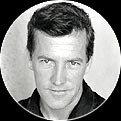| |
 |
 |
 |

Chris, 36, has worked in the film and television industry for 14 years. His experience so far has been concentrated on set decoration, but he has also been writing scripts--he says "with mild success"--for some 9 years. His studies at Syracuse University in New York included film esthetics, advertising, design, photography, and history. Chris grew up on the east coast of the United States, in Concord, Massachusetts and later Pleasantville, New York. |
|
 |
 |
 |

Bruce, 38, is a native of the Los Angeles area, but he did not fall into filmmaking immediately. He earned a degree in hotel and restaurant business management at San Diego State University in California, and worked in the field until 1993, when he decided to try his hand at acting. By 1995, he had made another career move--to the other side of the camera as a camera assistant. |
|
 |
|
 |
Chris and Bruce came to collaborate on this film through a UCLA extension course called Making a Short Film. Domestic Incident was one of only five projects that was ultimately chosen to be made through the course. Chris and Bruce are already working on their next project together.
|



